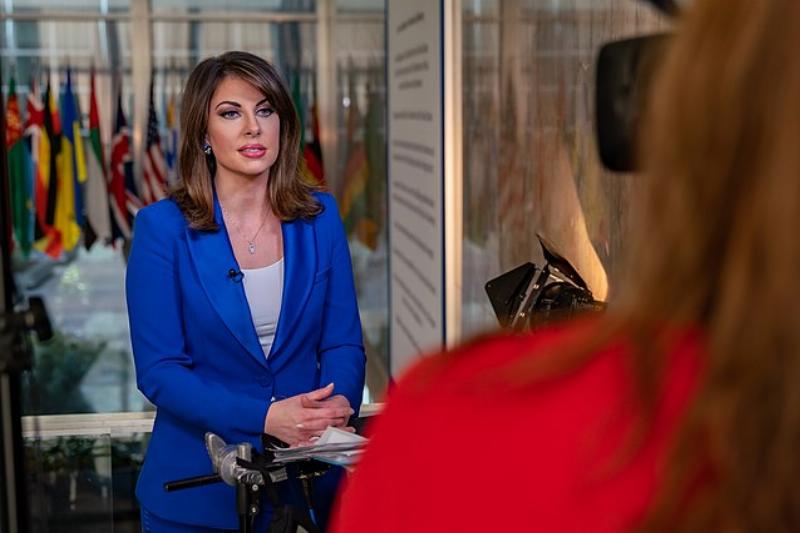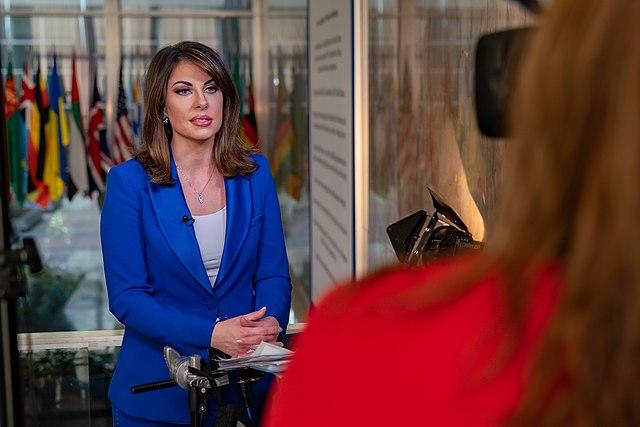


The recent reports indicating that Morgan Ortagus, the U.S. Deputy Special Envoy for Middle East Affairs, is poised to be replaced have raised significant concerns among observers of Middle Eastern diplomacy and U.S. foreign policy. Ortagus has been a key figure in Washington’s efforts to promote the disarmament of Hezbollah, a powerful armed group and political entity in Lebanon. Her potential departure risks weakening a critical American policy pillar designed to stabilize Lebanon and reduce Hezbollah’s influence—an outcome that would have serious repercussions for Lebanon and the broader region.
Morgan Ortagus: A Firm Voice Against Hezbollah’s Arms
Morgan Ortagus has been one of the most outspoken and persistent U.S. officials demanding that Hezbollah be disarmed. The group’s possession of heavy weaponry and military infrastructure outside the control of the Lebanese state has long been a source of internal and regional tension. For decades, Hezbollah has operated as a state within a state—wielding significant military power, political influence, and a vast network of social services, all while maintaining a military arsenal that exceeds that of many national armies.
Ortagus has consistently underscored the importance of Lebanon’s sovereignty and the rule of law. She has advocated for the Lebanese Armed Forces (LAF) to take sole responsibility for security and disarmament, reflecting Washington’s goal of restoring state authority across Lebanon. This position was central to her diplomatic efforts, which included meetings with Lebanese leaders such as President Joseph Aoun and Prime Minister Nawaf Salam. Her push for implementing ceasefire agreements aimed at disarming Hezbollah's unauthorized military positions was a concrete step toward reducing armed conflict and promoting peace.
The Stakes Are High: Hezbollah’s Weapons and Regional Security
Hezbollah’s armed status is a key obstacle to peace and stability in Lebanon and the broader Middle East. The group’s military capabilities, which include rockets and advanced weaponry, have contributed to recurring cycles of violence, including multiple wars with Israel. Furthermore, Hezbollah’s role as a proxy for Iran’s regional ambitions complicates Lebanon’s position and undermines its sovereignty.
The U.S. sees Hezbollah’s disarmament as critical to Lebanon’s stability. If the group’s military wing remains intact, it threatens not only Lebanon’s internal security but also the fragile balance of power in the region. Hezbollah’s arsenal is a flashpoint that can ignite broader conflicts, as seen in past confrontations that devastated Lebanon’s southern regions and displaced thousands.
Ortagus’s firm stance on Hezbollah’s disarmament signaled to both Lebanon and its neighbors that Washington was committed to pushing for tangible changes, rather than mere rhetoric. Her insistence on quick and decisive action was meant to pressure Lebanese officials and Hezbollah alike to abide by ceasefire terms and disarm illegal militias.
What Losing Ortagus Could Mean
The potential replacement of Ortagus raises the question: Will the U.S. maintain the same tough stance on Hezbollah, or will it soften its approach? A new envoy could adopt a different strategy—one less confrontational or less focused on immediate disarmament—which risks diluting U.S. leverage and emboldening Hezbollah.
Hezbollah has repeatedly justified its armed presence by citing alleged Israeli violations of ceasefire agreements and the need to defend Lebanon. This narrative resonates with many Lebanese citizens who view Hezbollah as a protector against Israeli aggression. Without strong U.S. pressure and clear diplomatic goals, Hezbollah could further entrench its military position, making disarmament even more difficult in the future.
Moreover, the Lebanese government is deeply divided and weakened by economic crisis, political dysfunction, and external interference. The LAF lacks the resources and political backing to challenge Hezbollah militarily. U.S. diplomatic leadership and international support are therefore crucial to strengthen Lebanon’s institutions and support efforts to bring all armed groups under state control.
Replacing Ortagus at this critical juncture could slow or stall progress. It might be perceived by Lebanese leaders and Hezbollah as a sign of wavering U.S. commitment, encouraging them to delay reforms and maintain the status quo. This would undermine the broader goal of restoring Lebanon’s sovereignty and security.
The Broader Context: U.S. Policy in the Middle East
Ortagus’s departure should also be viewed in the broader context of evolving U.S. policy in the Middle East. The region is undergoing significant shifts, including ongoing tensions between Iran and its regional rivals, economic challenges in Lebanon, and the enduring Israeli-Palestinian conflict. Washington’s approach to these issues requires careful calibration between diplomacy, security commitments, and strategic interests.
Maintaining a clear and firm policy on Hezbollah is essential not only for Lebanon’s stability but also for U.S. efforts to counter Iran’s influence. Hezbollah serves as a key Iranian proxy, and disarming the group would deal a significant blow to Tehran’s regional strategy.
Thus, a new envoy who softens the U.S. position risks weakening this broader strategic objective. Conversely, maintaining or strengthening Ortagus’s policies could support U.S. goals of stabilizing Lebanon, reducing conflict, and countering malign influence.
Conclusion: Why Ortagus’s Replacement Matters
Morgan Ortagus’s possible replacement is more than just a personnel change. It reflects a potential shift in U.S. policy at a time when clear leadership is desperately needed. Hezbollah’s disarmament is a complex and politically sensitive issue, but one that is essential for Lebanon’s future peace and stability.
Losing Ortagus’s firm voice could embolden Hezbollah and its allies to resist disarmament efforts, further destabilizing Lebanon and the region. It could also signal a weakening of U.S. commitment to restoring Lebanon’s sovereignty and security.
For Lebanon to move forward, the U.S. must maintain strong diplomatic leadership committed to clear goals—especially the disarmament of armed groups operating outside the state’s control. The international community, led by Washington, has a responsibility to back Lebanon’s institutions and support peace.
If the new envoy fails to carry forward Ortagus’s firm stance, the result could be a dangerous step backward for Lebanon, the Middle East, and U.S. strategic interests.

Image: Public domain.
